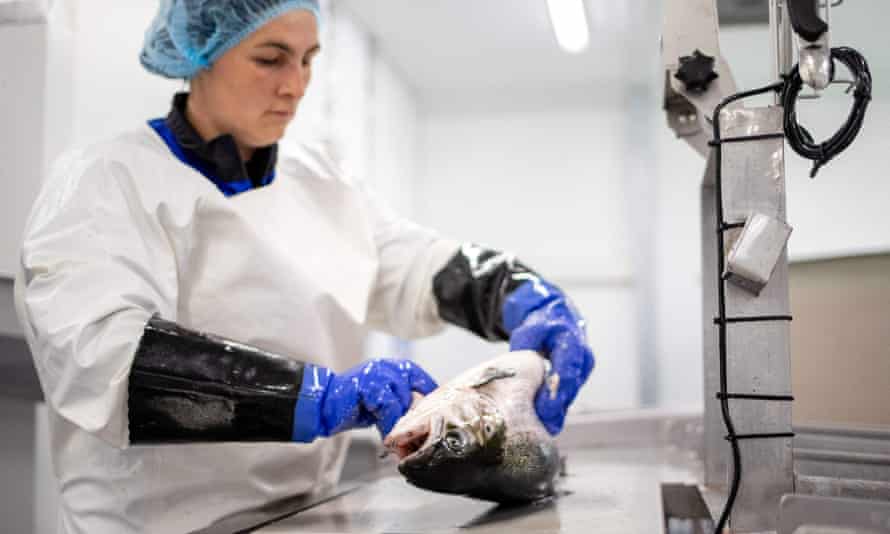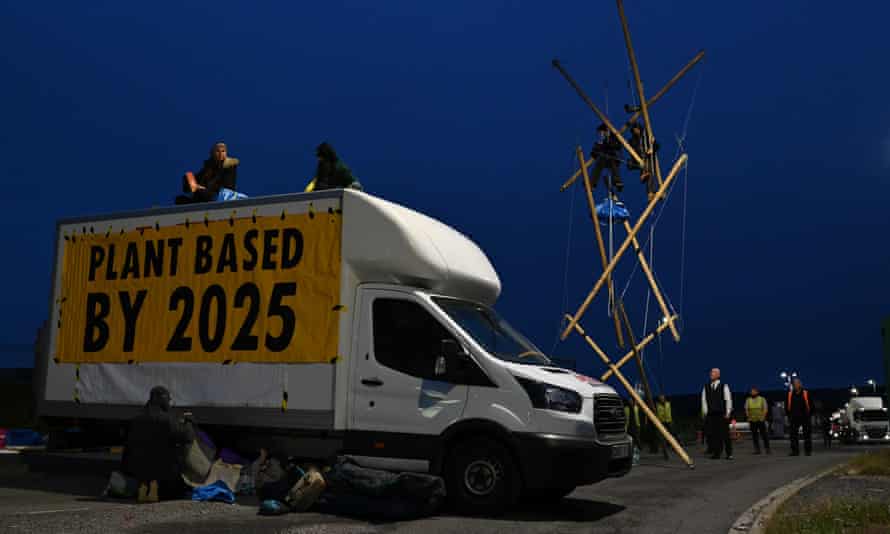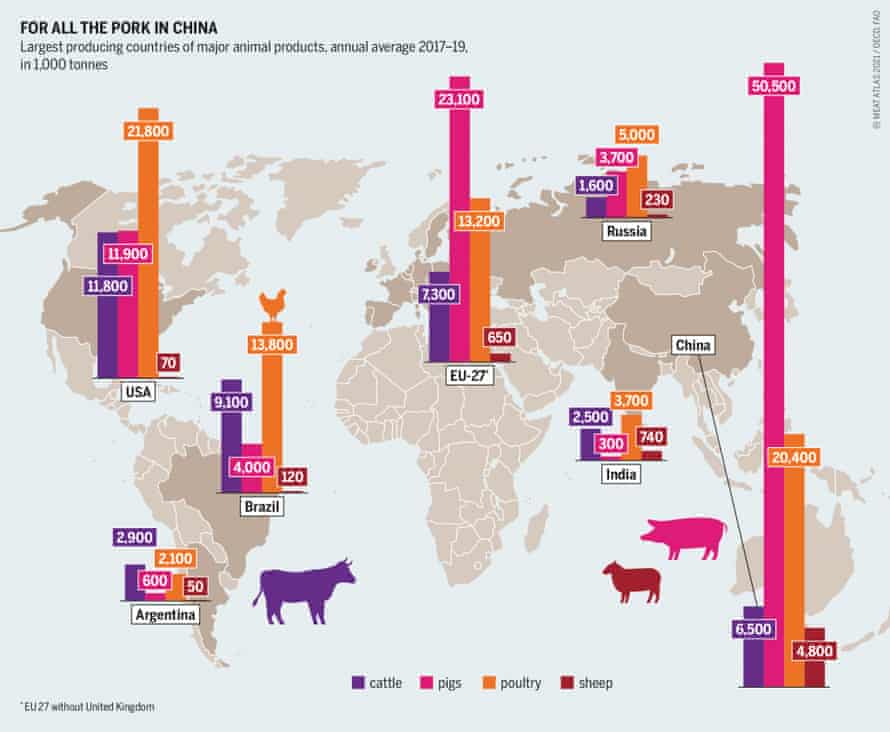Animals farmed: BSE in Brazil, UK pork crisis and radical Dutch plan to cut livestock numbers
Welcome to our monthly roundup of the biggest issues in farming and food production, with must-read reports from around the web

News from around the world
Brazil has confirmed two cases of BSE, or mad cow disease, and has suspended beef exports to China. Ireland, a smaller beef supplier to China, reported a case of mad cow disease in May last year, but has not yet been able to resume exports. However, the Brazilian ban is not expected to last for long, with Brazil accounting for 40% of China’s beef imports.
Greenhouse gases released by New Zealand’s 6 million-cow dairy industry have hit an all-time high. Agriculture made up more than half of the country’s total industry and household emissions. The increase continued a longer-term rise in emissions from New Zealand agriculture, up 5.5% in the past decade.
Land-based fish farming has a bright future, according to supporters, despite setbacks suffered by one of its major operators, Atlantic Sapphire. The company lost 500 tonnes of fish this year after technical issues. It also feared running out of oxygen, which had been bought up by US hospitals hit by a new wave of coronavirus infections. Land-based farms have no exposure to the ocean other than fast-flowing, temperature-controlled water, which is pumped in and out of the fish tanks around the clock.
Deforestation in the Brazilian Amazon has hit the highest annual level in a decade, according to reports. Researchers have called for tougher action to prevent illegal agriculture-led deforestation in the region, after efforts were hampered by budget cuts for the environment ministry and environmental protection agencies.
Cases of the deadly pig disease African swine fever among the wild boar population in Germany have passed 2,000 a year, after the virus first spread from Poland. Ten farms have been affected so far, with thousands of pigs culled. China has still not lifted its ban on German pork imports as a result of the ASF cases.
UK news
As many as 70,000 British pigs are set to be destroyed over the next few weeks, due to staff shortages in the industry of up to 13%, according to the National Pig Association. The number of producers is also declining, as they struggle with higher feed and labour costs and inadequate market prices for pigs.
New restrictions on the transport of farm animals are to be introduced. As well as a ban on the live export of animals for slaughter overseas, there will be limits on domestic journey times and a ban on journeys during very cold or hot weather.
A Conservative MP has lodged a bill to ban the use of cages in egg production in the UK, which are still used for about half the national flock. A commitment to phase out their use was contained in the last Conservative election manifesto; however, the industry has said any ban would also have to apply immediately to imports of eggs and egg products.
Meanwhile, campaigners are calling for UK chicken consumption to be reined in and for an immediate ban on new intensive poultry sheds. They cite the damaging impact that soya, grown in South America but fed to UK chickens, is having on the world’s climate and on wildlife in the countries where it is produced. The UK produces about a billion chickens a year, the great majority of which are reared in indoor units.

Vegan activists have blockaded one of the UK’s major dairy distribution plants, demanding that owners Arla become plant-based by 2025. A report from Arla, a farmers’ cooperative, found its dairy farmers were producing milk with a carbon footprint around half the global average. It said it intends to reach net zero emissions by 2050.
More than 100,000 people have signed a petition calling on retailer Marks & Spencer to stop labelling its farmed salmon as “responsibly sourced”, which they say is misleading because of pollution, overfishing and animal welfare concerns. In response, M&S has said its salmon is reared to globally leading standards, backed by multiple farm audits from independent bodies, including RSPCA Assured.
From the Animals farmed series
Four powerful companies control more than 80% of the US beef market. Sarah Mock examined how the “big four” grew into behemoths and asked whether President Joe Biden will be successful in his efforts to take on the meat giants and increase competition in the industry.
Politicians in the Netherlands – which has one of Europe’s largest livestock industries and is also the EU’s biggest meat exporter – are considering radical plans to force hundreds of farmers to sell up and cut livestock numbers, to reduce damaging ammonia pollution.

Globally, 20 livestock companies are responsible for more greenhouse gas emissions than either Germany, Britain or France – and are receiving billions of dollars in financial backing in the process, according to a new report by environmental campaigners.
Sophie Kevany reported NGOs’ concerns that ships and lorries carrying livestock are being used to smuggle drugs and other contraband. And Summer Sewell revealed how an immigrant workforce is keeping America’s dairy industry going as it shifts to ever-bigger intensive units.
Hundreds of cosmetics products sold in the UK and Europe – including moisturisers, lipsticks, hair conditioner and sunscreen – contain ingredients that have been tested on animals, despite bans that outlawed such testing years ago, according to a new analysis.
On the Guardian’s Global Development site, Emma Naluyima Mugerwa and Lora Iannotti warned that growing criticism of industrial farming in the west threatens to undermine support for livestock in the developing world. “Sustainable, profitable livestock farming is a powerful option for … a way to better health and a better life,” they wrote.
Finally, farmer Chris Newman from northern Virginia talked to writer Taylor Moore as part of Guardian US’s Green Light series about why feeding people needs to be at the heart of sustainable farming. In Newman’s words: “How is it sustainable if only 1% can afford your food?“
Share your stories and feedback
Thank you to everyone who has been in touch to share their thoughts on the series. Reader Matt Sapero writes to ask whether, after its pledge to renounce fossil fuel advertising, the Guardian will also reject all non-vegan food ads, as: “… animal agriculture creates at least as much greenhouse gas, mainly methane, as fossil fuels“.
And, responding to our report on greenhouse gas emissions from meat and dairy farms, Zsuzsanna Kovacs says: “There is no question that large numbers of animals squeezed into small spaces cause all kinds of emission problems, to name only one problem. However, the problem with these articles is that animals get blamed, not management practices.”
To air your views, or share your experiences and stories from inside the farming industry, please contact us at: animalsfarmed@theguardian.com.
And if you want to receive this Animals farmed monthly update via email, you can sign up here to get a roundup of the best farming and food stories across the world and keep up with our investigations.
